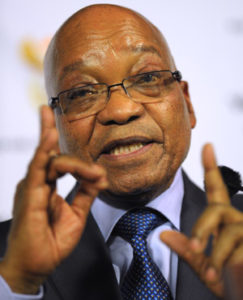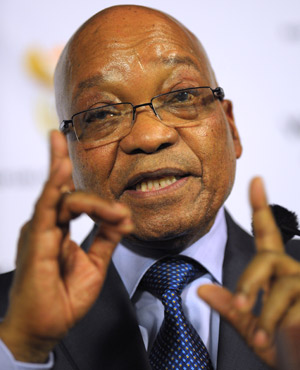2017-10-01 06:00
Dewald van Rensburg-

Multimedia · User Galleries · News in Pictures
Now we know the enormity of the bullet South Africa dodged, at least temporarily, in December 2015 when Des van Rooyen got kicked out of Treasury after three days on the job.
Weekend Special walked into Treasury with “adviser” Mahomed Bobat at his side.
Bobat followed him out the door, and they landed about 2km down the road at the department of cooperative governance and traditional affairs after President Jacob Zuma was forced to do damage control.
Only three weeks after Van Rooyen’s arrival, the wheels were set motion to start extracting deals from the department for Bobat’s colleagues at Trillian Capital Partners, where Bobat really worked, although Trillian denies this.
Imagine what these people had planned for Treasury – the capture of which they had planned for months.
The release this week of short-lived Trillian executive Bianca Goodson’s account about her time at the company shows us the almost banal workaday way state capture operated, cloaked in the language of professional consultants everywhere.
The company was set up in late 2015 and had a simple model: Gupta lieutenant Salim Essa scores consultancy work from the state and this goes to some or other international consultancy firm such as McKinsey at Eskom, or Oliver Wyman at the cooperative governance department.
Trillian becomes the “supplier development” partner for 50% of the fees.
Where work is actually to be done, it is subcontracted. Goodson cites Cutting Edge, which is a subsidiary of the Guptas’ Sahara Systems, as actually deploying workers to Eskom.
The job being done was “business facilitation”, as Goodson puts it. But it is basically an extreme form of fronting.
The company explicitly planned for “the current dispensation”, meaning the remainder of Zuma’s term in office, she said.
Goodson was one of the unnamed informants for Advocate Geoff Budlender’s report into Trillian, which was released in June.
A lot of the facts she spells out – about multimillion-rand invoices to state-owned companies for little or no work – were already known.
What is new is the trivia around how Trillian functioned and the speed with which it gained a foothold in the department, thanks to Bobat.
Taking the game to a higher level
Goodson recounts how work with the department was set up when Trillian Management Consulting had all of two employees – including herself.
Goodson was instructed to fake her way through a presentation to Van Rooyen “to present capabilities for an organisation that had no prior history – and for work not yet identified as a need”.
Van Rooyen “appeared satisfied”, she noted.
Oliver Wyman, the international consultancy that would effectively do the work, was gushing about the spectacular access Trillian enjoyed, she said.
Bobat then apparently left white envelopes on Goodson’s desk, telling her what to put into unsolicited project proposals for the department.
Again, imagine what these envelopes would have contained if Van Rooyen had stayed at Treasury.
Goodson says that Trillian billed Eskom R30.6m at a time when it literally had no people who could have been doing any work.
A still anonymous former executive at Trillian, who spoke to Budlender, said the same kind of thing happened with Transnet at the same time.
In February last year, Trillian invoiced Transnet R10m alongside a proposal, before any work could conceivably have been done.
Budlender collected Trillian invoices to Transnet for well more than R100m in the first half of last year. He also gathered invoices evidently paid by Eskom for more than R260m between late 2015 and the end of last year.
This was while his access to information was being systematically stymied by Trillian management, according to his report.
Goodson’s new full account adds essential details about the culture underpinning this giant fraud.
You want to believe the villains in our national drama operate in the shadows.
In reality, they go to power lunches and meetings in Johannesburg’s most fantastical office park – Melrose Arch.
The people who set up the machinery are Integrated Capital Management (ICM) – a three-man team with an office in Melrose Arch next to Essa’s.
ICM directors Clive Angel, Mark Chipkin and Shane Stanley effectively ran the place, with Essa, in Angel’s words, being “the boss”.
ICM has a catch-all statement on its website: “Recent media suggestions of any wrongdoing by directors of Integrated Capital Management are completely unfounded and without merit.
“On advice from counsel, we will, for the time being, refrain from making further media statements.”
It calls its team “highly qualified investment professionals with a track record of professionalism and integrity”.
This is, to some extent, true. Angel used to work for Grant Thornton and later for Investec, according to his CV.
In Goodson’s account, however, he looks like a creep and a bully, but not an unfamiliar one.
Goodson recounts his mansplaining the “realities” of business to her when she raised questions about the mysterious windfalls Trillian enjoyed.
The men running this show would casually employ the now mainstream rhetoric of comparing themselves with the business empires rooted in the apartheid era.
“How do you think Investec or Anglo became so successful?” Angel allegedly told Goodson at one point.
He would imply that the ends justify the means, a common refrain in the Gupta family’s all-out propaganda war.
“South Africa’s wealth should not only be in the hands of the Ruperts and Koseffs of the world,” Goodson was told.
The toxic work environment Goodson endured for five months got to her.
In her version, she did not understand that Trillian was not meant to do anything. She recounts the hostility of the McKinsey staff towards her – a strained relationship that ended with her breaking down in tears in Eskom’s foyer while meeting Matshela Koko, then the power generation head and now facing disciplinary proceedings.
At a packed panel discussion this week, former finance minister Pravin Gordhan and economist Iraj Abedian raised the culpability of the professional classes in the ever-expanding drama of state capture.
“You cannot steal in a modern economy without professional infrastructure. You need to have chartered accountants, lawyers and your McKinseys,” said Abedian.
Even Goodson, who is now cloaked in the sainthood of whistle-blowers, was clearly flexible.
Her resignation letter does not so much complain about what Trillian was doing as it complains about her not getting rewarded for the risks.
In other words, she was not being paid well enough to take on the very real probability of getting caught in what is obviously corruption.
It has been said that the upper echelons of the corporate world is full of highly functional sociopaths – people who would be considered insane and dangerous in a noncapitalist system.
The crew at ICP and Trillian are of this world.
They don’t seem unfamiliar at all – they just took the game to a higher level.
http://www.news24.com/SouthAfrica/News/the-capture-mind-set-20170930

